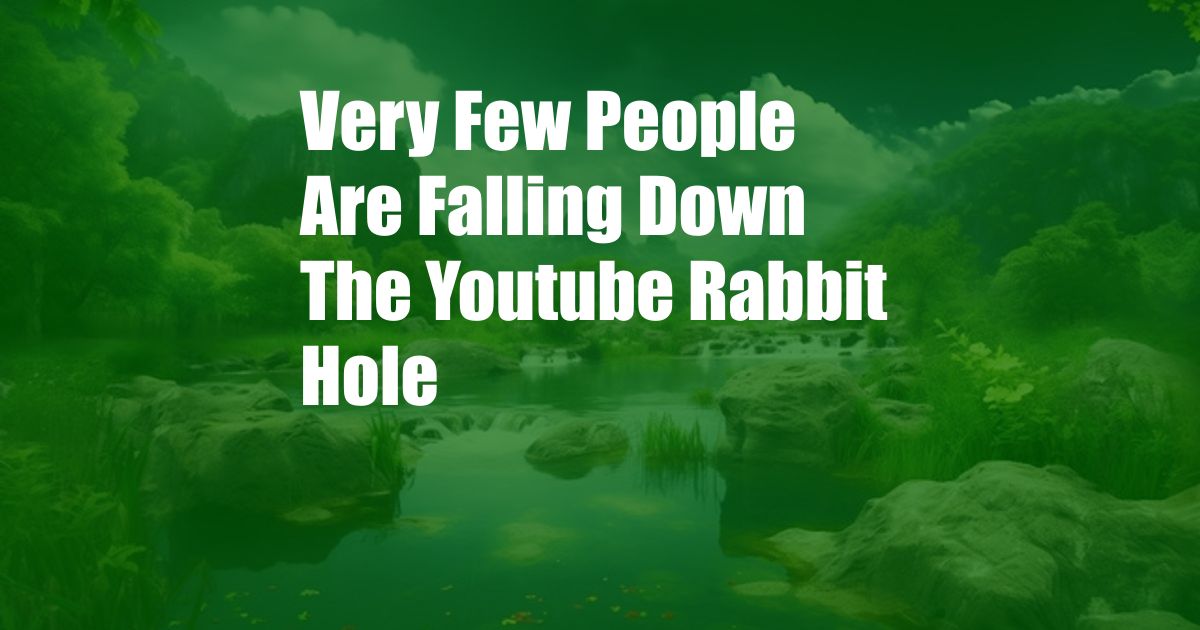
The Diminishing Lure of the YouTube Rabbit Hole: An Exploration
In the realm of digital entertainment, YouTube has long reigned supreme, capturing the attention of millions globally with its seemingly endless stream of captivating content. From mind-boggling videos to educational documentaries, the platform’s allure has kept users hooked for hours on end, creating a phenomenon known as the “YouTube rabbit hole.”
However, recent observations suggest a shift in this paradigm. While YouTube remains a popular destination, the once-uncontrollable pull of the rabbit hole has waned. The number of people succumbing to its depths has dwindled, leaving us to question the reasons behind this newfound resistance.
The Rise and Fall of the YouTube Rabbit Hole
The YouTube rabbit hole, a term coined to describe the addictive nature of the platform’s recommendation algorithm, has been a subject of both fascination and concern. Viewers would often find themselves spiraling down a never-ending vortex of related videos, unaware of the passage of time.
This phenomenon flourished in the early days of YouTube, when the algorithm’s primary goal was to maximize user engagement. Videos were recommended based solely on watch history, leading users down narrow and often repetitive paths. However, as the platform evolved and competition intensified, the algorithm underwent several revisions, broadening its scope and incorporating factors such as diversity and relevance.
Cognitive Overload: The Saturation of Online Content
One of the key factors contributing to the decline of the YouTube rabbit hole is cognitive overload. In the digital age, we are constantly bombarded with a deluge of information from multiple sources, including social media, news outlets, and streaming services. This relentless bombardment can lead to information fatigue and a decrease in our capacity for sustained attention.
The sheer volume of content on YouTube has exacerbated this problem. Users are overwhelmed by the constant stream of new videos, making it increasingly difficult to find truly engaging and meaningful content. As a result, the allure of the rabbit hole diminishes, as viewers become less willing to invest their limited attention spans in endlessly scrolling through endless lists of recommendations.
The Search for Meaning and Relevance
Another factor behind the decline of the rabbit hole is the growing demand for more meaningful and relevant content. Viewers are becoming increasingly selective about how they spend their time online, prioritizing content that aligns with their interests and provides value.
YouTube’s algorithm, while effective at increasing engagement, has often been criticized for promoting sensational and low-quality content. Users have grown tired of being served videos that are designed to shock or entertain rather than inform or inspire. As a result, they are actively seeking alternative platforms and content creators that offer more meaningful and enriching experiences.
Tips for Navigating the Digital Landscape
In light of the evolving digital landscape, it is essential to develop strategies for navigating the vast sea of online content. Here are a few tips to help you avoid getting lost in the rabbit hole:
- **Practice mindful consumption:** Be intentional about the content you consume. Choose videos that align with your interests, goals, and values. Avoid mindless scrolling and limit your screen time.
- **Diversify your content sources:** Explore alternative platforms, social media groups, and subscription services to broaden your content exposure. This will reduce the risk of getting stuck in an echo chamber and ensure that you are consuming a wide range of perspectives and ideas.
- **Curate your own playlists:** Create playlists of videos that you find particularly valuable and engaging. This will allow you to access your favorite content quickly and easily, reducing the temptation to mindlessly browse the recommendations.
FAQs
- Q: Why am I not falling down the YouTube rabbit hole as much anymore?
A: It could be due to cognitive overload, the saturation of online content, or the growing demand for more meaningful and relevant content.
- Q: What can I do to prevent getting lost in the rabbit hole?
A: Practice mindful consumption, diversify your content sources, and curate your own playlists.
- Q: Are there any benefits to avoiding the rabbit hole?
A: Yes, it can help you reduce cognitive overload, increase your productivity, and improve your overall digital well-being.
Conclusion
The decline of the YouTube rabbit hole signifies a shift in our digital habits. As users become more selective about how they spend their time online, the allure of endlessly scrolling through recommendations has waned. By embracing mindful consumption, diversifying our content sources, and pursuing meaningful experiences, we can navigate the vast digital landscape with greater intention and purpose.
Would you like to learn more about the YouTube rabbit hole and its impact on our digital lives? Share your thoughts in the comments below!